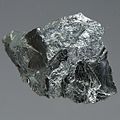Chromium
Information about Chromium[edit]
Chromium is an essential trace element which plays an important role in carbohydrate and lipid metabolism.
Deficiency of Chromium[edit]
Chromium deficiency has been linked to insulin resistance and diabetes, and oral supplementation with trivalent chromium has been found to improve insulin sensitivity and glucose tolerance. Claims have been made that chromium also benefits muscle building. As a consequence, chromium is a frequent component of vitamin, mineral and general nutritional supplements. Trivalent chromium is not well absorbed as simple salts, and complexes of chromium have better bioavailability.
Dosage and administration for Chromium[edit]
Chromium is available in multiple oral formulations (picolinate, dinicocysteinate, complexed with nicotinic acid and in brewer's yeast), in tablets and capsules in concentrations of 150 μg to 1000 μg, and as chromic chloride in a liquid solution (4 μg/mL) for use in parenteral nutrition.
Side effects of Chromium[edit]
In concentrations found in foods and in doses used clinically, chromium has been reported to be safe and without appreciable toxicity. Nevertheless, there have been at least two publications describing renal injury from ingestion of moderately high doses of chromium picolinate for 1 and 4 months, one of which was accompanied by transient liver injury with features of acute hepatic necrosis.
Toxicity[edit]
High doses of chromium, and particularly hexavalent chromium (6+), can be toxic. Hexavalent chromium is an industrially important metal used in stainless steel and other alloys and is a potent oxidizing agent with known toxicity to industrial workers. Acute, high dose ingestion of chromium (both trivalent and hexavalent) can cause severe, immediate multiorgan (including liver) damage and death. Lower dose chronic occupational exposure is associated with skin and local tissue injury and may be carcinogenic.
Trace Elements in Tissues and Biologic Systems[edit]
| Aluminum | Copper | Nickel |
| Antimony | Fluorine | Rubidium |
| Barium | Iodine | Selenium |
| Boron | Lead | Silver |
| Bromine | Lithium | Strontium |
| Cadmium | Manganese | Tin |
| Chromium | Mercury | Vanadium |
| Cobalt | Molybdenum | Zinc |
-
Chromium
-
Chromium
-
Chromium
-
Chromium
-
Chromium
-
Chromium
-
Chromium
-
Chromium
-
Chromium
-
Chromium
-
Chromium
-
Chromium
Ad. Transform your life with W8MD's Budget GLP-1 injections from $75


W8MD offers a medical weight loss program to lose weight in Philadelphia. Our physician-supervised medical weight loss provides:
- Weight loss injections in NYC (generic and brand names):
- Zepbound / Mounjaro, Wegovy / Ozempic, Saxenda
- Most insurances accepted or discounted self-pay rates. We will obtain insurance prior authorizations if needed.
- Generic GLP1 weight loss injections from $75 for the starting dose.
- Also offer prescription weight loss medications including Phentermine, Qsymia, Diethylpropion, Contrave etc.
NYC weight loss doctor appointmentsNYC weight loss doctor appointments
Start your NYC weight loss journey today at our NYC medical weight loss and Philadelphia medical weight loss clinics.
- Call 718-946-5500 to lose weight in NYC or for medical weight loss in Philadelphia 215-676-2334.
- Tags:NYC medical weight loss, Philadelphia lose weight Zepbound NYC, Budget GLP1 weight loss injections, Wegovy Philadelphia, Wegovy NYC, Philadelphia medical weight loss, Brookly weight loss and Wegovy NYC
|
WikiMD's Wellness Encyclopedia |
| Let Food Be Thy Medicine Medicine Thy Food - Hippocrates |
Medical Disclaimer: WikiMD is not a substitute for professional medical advice. The information on WikiMD is provided as an information resource only, may be incorrect, outdated or misleading, and is not to be used or relied on for any diagnostic or treatment purposes. Please consult your health care provider before making any healthcare decisions or for guidance about a specific medical condition. WikiMD expressly disclaims responsibility, and shall have no liability, for any damages, loss, injury, or liability whatsoever suffered as a result of your reliance on the information contained in this site. By visiting this site you agree to the foregoing terms and conditions, which may from time to time be changed or supplemented by WikiMD. If you do not agree to the foregoing terms and conditions, you should not enter or use this site. See full disclaimer.
Credits:Most images are courtesy of Wikimedia commons, and templates, categories Wikipedia, licensed under CC BY SA or similar.
Translate this page: - East Asian
中文,
日本,
한국어,
South Asian
हिन्दी,
தமிழ்,
తెలుగు,
Urdu,
ಕನ್ನಡ,
Southeast Asian
Indonesian,
Vietnamese,
Thai,
မြန်မာဘာသာ,
বাংলা
European
español,
Deutsch,
français,
Greek,
português do Brasil,
polski,
română,
русский,
Nederlands,
norsk,
svenska,
suomi,
Italian
Middle Eastern & African
عربى,
Turkish,
Persian,
Hebrew,
Afrikaans,
isiZulu,
Kiswahili,
Other
Bulgarian,
Hungarian,
Czech,
Swedish,
മലയാളം,
मराठी,
ਪੰਜਾਬੀ,
ગુજરાતી,
Portuguese,
Ukrainian









